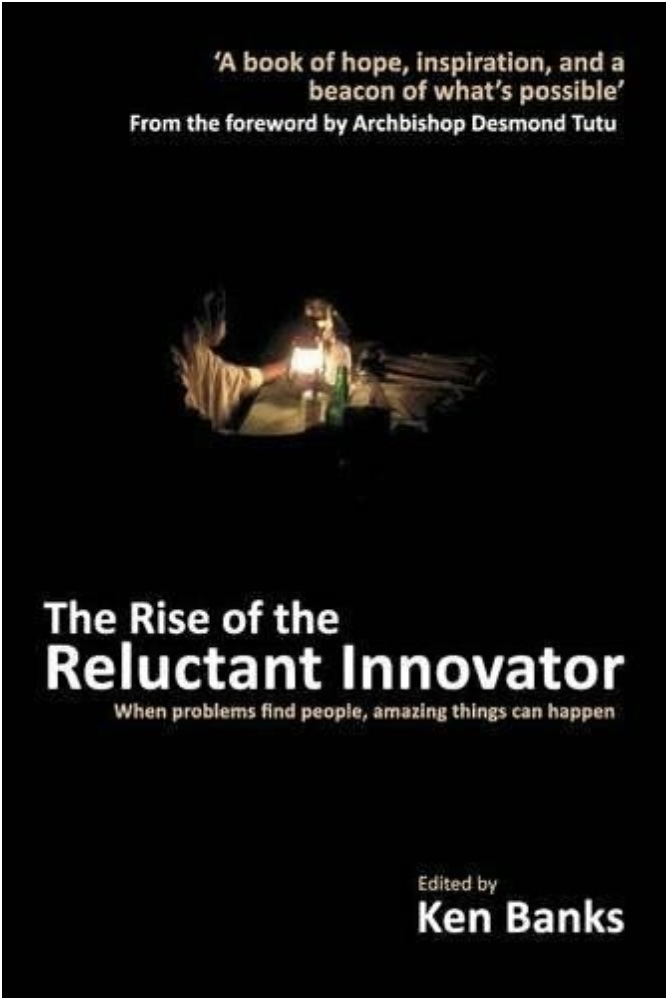The Rise of the Reluctant Innovator
This book features the stories of 10 social innovators from around the world. One of them is Laura Stachel, founder of WE CARE Solar, which designs portable solar-lighting kits for maternity wards. Now Solar Suitcases save the lives of mothers and newborns throughout the developing world.
The book and reluctantinnovation.com website were made possible by crowdfunding through the RSA, personal funds and a donation from a US foundation.
Classes in social innovation, social entrepreneurship and design thinking have become increasingly popular in recent years. On the one hand, this might be seen as a good thing. After all, the world needs as many smart, engaged citizens as it can get, particularly when you consider the multitude of challenges we face as a planet.
But does a career in social change really begin in the classroom, or out in the real world? How much social change is planned, and how much accidental? And which approach tends to lead to the most meaningful, lasting or impactful solutions?
With a foreword from Archbishop Desmond Tutu, “The Rise of the Reluctant Innovator” provides a welcome challenge to conventional wisdom in social entrepreneurship. It highlights the personal stories of ten social innovators from around the world. Ten social innovators – ordinary people – who randomly stumbled across problems, injustices and wrongs and, armed with little more than determination and belief, decided not to turn their backs but to dedicate their lives to solving them.
Innovators featured in this book
Watching yet another Spanish movie in his friend’s apartment to avoid writing up his doctoral dissertation, Brij Kothari makes a throwaway comment about subtitles, which plants the seed of an idea and spawns a literacy initiative that has had, in Bill Clinton’s words, “a staggering impact on people’s lives”.
Worried about the political turmoil in Kenya, and concerned at the lack of information that is forthcoming from his adoptive country, Erik Hersman mobilises his own five-strong army to conceive, create and launch a web-based facility that revolutionises how breaking news is disseminated worldwide.
Parachuted into the middle of sub-Saharan Africa with a brief to collect public health data, and confronted with a laborious, environmentally wasteful paper-based system, paediatrician Joel Selanikio finds the perfect outlet for the skills he acquired as a Wall Street computer consultant.
Intending to ground himself in the realities of global health during his internship in rural Malawi, Josh Nesbit discovers that it is hard to sit on the sidelines and soon finds himself proposing a solution to overcome the difficulty of connecting patients, community health workers and hospitals.
After watching local doctors and midwives struggle to treat critically ill pregnant women in near-total darkness on a Nigerian maternity ward, where an untimely power cut can mean the difference between life and death, obstetrician Laura Stachel delivers a solar-based solution that enhances survival prospects.
Observing how well the autistic son of a close friend responds to the therapeutic effects of a Chinese massage technique that she has advocated using, Louisa Silva is convinced that the treatment has the potential to benefit thousands of others, but she needs to prove it.
Haunted by the memory of being separated from her older sister during a childhood spent in foster care, and horrified that other siblings are continuing to suffer the same fate, Lynn Price resolves to devise a way to bring such people back together.
An unexpected conversation over dinner leads Priti Radhakrishnan to build an innovative new organisation with a mission to fight for the rights of people denied access to life saving medicines.
Until a visit to the dermatologist turns her world upside down, Sharon Terry has never heard of pseudanthoma elasticum (PXE), but when she discovers that research into the disease afflicting her children is hidebound by scientific protocol, she sets about changing the system with characteristic zeal.
Encounters and conversations with leftover people occupying leftover spaces and using leftover materials, at home and abroad, led architecture professor Wes Janz to view them as urban pioneers, not victims, and teach him a valuable lesson: think small and listen to those at the sharp end.
Reviews
“A book of hope, inspiration and a beacon of what’s possible”
Archbishop Desmond Tutu, Nobel Peace Prize Winner
“This book’s vivid, engaging stories – of ordinary people who have devoted their lives to solving problems and injustices they never expected to encounter – make a major contribution to understanding what social innovation is all about. This is an inspiring and essential read for everyone who cares about our flawed, messy, beautiful world and believes in its myriad possibilities”
Hannah Bloch, Mission Projects Editor, National Geographic Magazine
“The world’s most challenging problems are being taken on by people motivated by their personal passions, informed by their deep understanding of local realities and shaped by their frustration with inadequate solutions. Ken Banks and the other remarkable innovators here offer inspiration and insight into building practical solutions while calling into question established wisdom about social innovation. This is a must-read book for anyone who wants to solve problems with global implications through local knowledge and involvement”
Ethan Zuckerman, Director, Center for Civic Media at MIT



